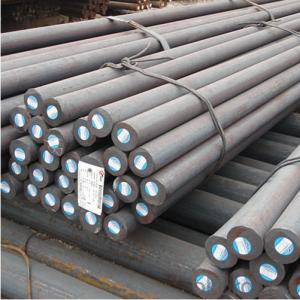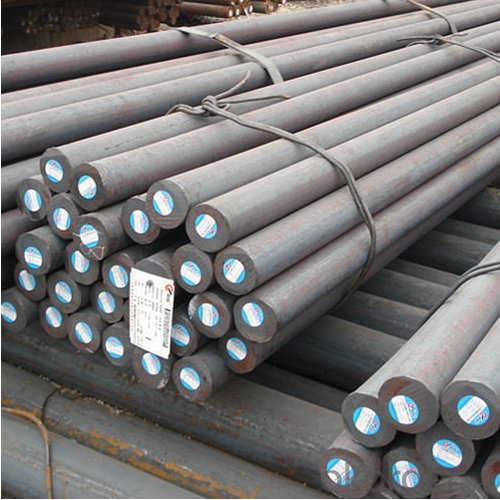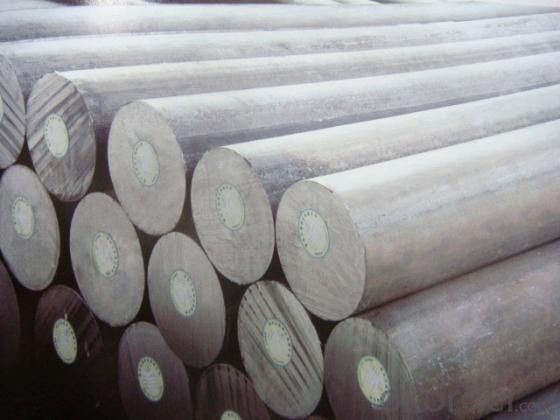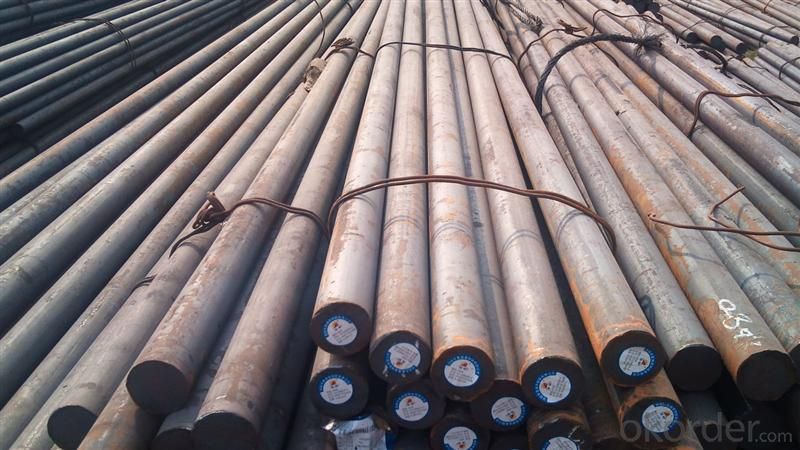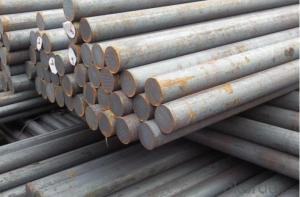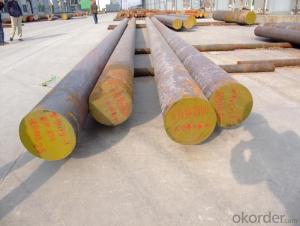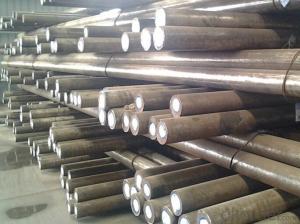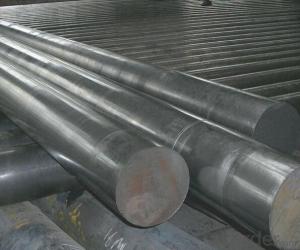30Cr JIS SCr430 DIN1.7030 ASTM 5130
- Loading Port:
- Tianjin
- Payment Terms:
- TT OR LC
- Min Order Qty:
- 25 m.t.
- Supply Capability:
- 50000 m.t./month
OKorder Service Pledge
OKorder Financial Service
You Might Also Like
Specification
30Cr JIS SCr430 DIN1.7030 ASTM 5130
Product Description:
1. Grade: 30Cr JIS SCr430 DIN1.7030 ASTM51300
2. Specification: Dia: 80~800mm Length:2000-13000mm or as required
3. Process: EAF+LF+VD+ Forged+ Heat Treatment (Annealed,A Normalized, Q+T)
4. Machine Capability
Tensile strength (N/mm2Mpa): >=885
Elongation %: >=11
Yield strength: >=685
Hardness: HBS less than 187
Reduction of area:>=45%
5. Inspection: 100% Ultrasonic according to the test standards:SEP1921-84,GR.3 CLASS C/C or by SGS ,AHK or Alex Stewart
6. Packing situation: standard seaworthy packing or as customer required
7. Delivery time: 45 days after order confirmed
8. Payment: T/T or L/C at sight.
Chemical Compositon:
C | Si | Mn | Cr | Ni | Cu |
Equal or less than | |||||
0.27-0.34 | 0.17-0.37 | 0.50-0.80 | 0.80-1.10 | 0.30 | 0.30 |
Application:
(1) Generally used for producing the important parts with high strength and good plastic.
(2) After nitrogen treatment, used for producing the important parts with special performance
requirements, such as shafts, gears, fasteners, bolt of large dia steamer etc.
Advantage:
1, Fast response in reply
2, Good communication sales with reasonable price.
3,Good quality materials.
4,Fast lead time.
5,Rich experience in export business.
6,Well after sales service.
Product Show:
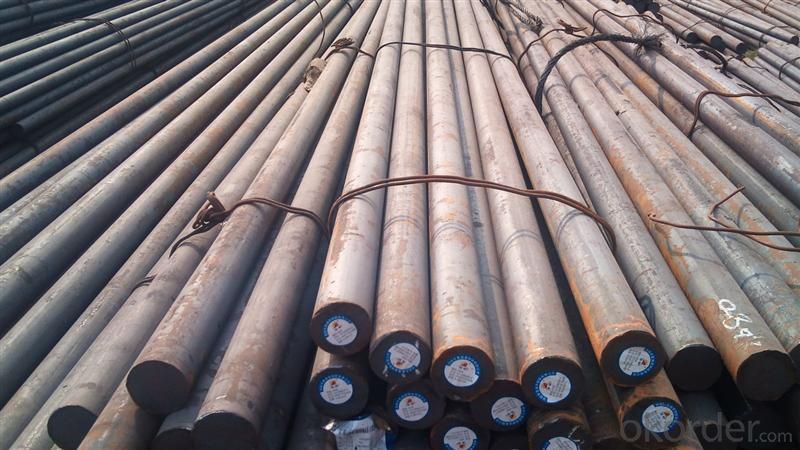
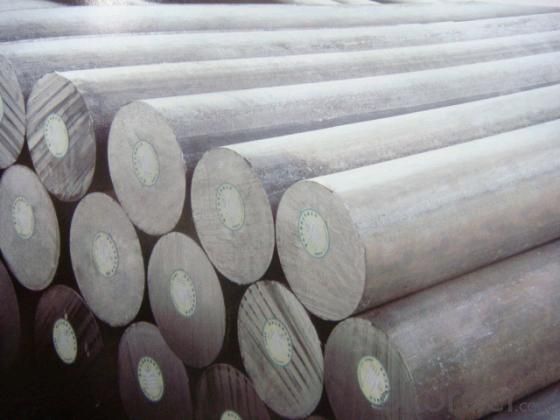
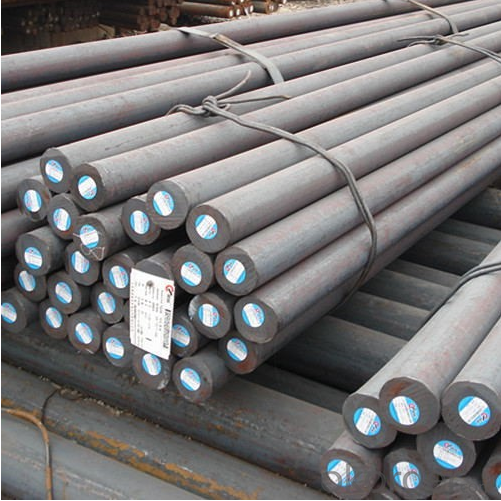
- Q: What are the specific requirements for special steel used in the railway wheel industry?
- The specific requirements for special steel used in the railway wheel industry include high strength and durability to withstand heavy loads and constant rolling, excellent fatigue resistance to withstand repeated stress cycles, good wear resistance to minimize wear and tear, and sufficient toughness to resist fractures. The steel should also possess good heat treatment properties to ensure proper hardening and tempering for desired strength and hardness levels. Additionally, it should have low impurities and be capable of withstanding harsh operating conditions, such as extreme temperatures and corrosion, to ensure a long service life.
- Q: What are the different techniques used for joining special steel?
- Some of the different techniques used for joining special steel include welding, brazing, soldering, and adhesive bonding. Each technique has its own advantages and considerations depending on the specific application and properties of the steel being joined. Welding involves melting and fusing the steel together, while brazing and soldering use a lower temperature to join the steel with a filler material. Adhesive bonding uses a strong adhesive to bond the steel surfaces together. The choice of technique depends on factors such as the strength required, the materials being joined, and the desired properties of the final joint.
- Q: What are the different applications of high-speed special steel?
- High-speed special steel is a type of steel specifically designed to endure high temperatures and maintain its hardness at high speeds. Its exceptional properties make it suitable for a wide range of applications in various industries. Some of the diverse uses of high-speed special steel include: 1. Cutting Tools: In the manufacturing of drills, milling cutters, taps, and saw blades, high-speed special steel is extensively employed. Its outstanding hardness, heat resistance, and wear resistance make it perfect for machining operations involving high temperatures and high-speed cutting. 2. Aerospace Industry: High-speed special steel is extensively utilized in the production of aircraft components in the aerospace industry. It is employed to manufacture turbine blades, engine parts, and other critical components that require exceptional strength, resistance to high temperatures, and excellent fatigue resistance. 3. Automotive Industry: The automotive industry incorporates high-speed special steel in the manufacturing of engine components, gears, and bearings. Its ability to endure high temperatures, resist wear, and provide strength makes it suitable for various automotive applications. 4. Power Generation: High-speed special steel is employed in power generation industries such as thermal power plants, nuclear power plants, and wind energy. It is used to manufacture turbine blades, rotors, and other components that operate at high temperatures and high rotational speeds. 5. Tool and Die Making: The tool and die making industry extensively utilizes high-speed special steel where precision and durability are crucial. It is employed to produce molds, dies, punches, and other tooling components that require exceptional strength, wear resistance, and toughness. 6. Medical Instruments: High-speed special steel is increasingly being used in the medical field to manufacture surgical instruments, dental tools, and implants. Its corrosion resistance, high strength, and biocompatibility make it suitable for medical applications. 7. Industrial Machinery: High-speed special steel finds applications in various industrial machinery such as bearings, gears, shafts, and cutting tools. Its ability to endure high temperatures, resist wear, and provide strength contributes to the efficiency and reliability of industrial equipment. In conclusion, high-speed special steel is a crucial material that finds numerous applications across industries. Its unique properties, including high temperature resistance, hardness, wear resistance, and strength, make it essential for cutting tools, aerospace components, automotive parts, power generation equipment, tool and die making, medical instruments, and industrial machinery.
- Q: How does special steel perform in high-temperature applications?
- Special steel performs exceptionally well in high-temperature applications due to its unique composition and properties. It exhibits excellent heat resistance, maintaining its strength and hardness even at elevated temperatures. Special steel also demonstrates exceptional thermal stability, preventing deformation and maintaining dimensional stability under extreme heat. Additionally, it possesses excellent oxidation and corrosion resistance, ensuring longevity and durability in high-temperature environments. Overall, special steel is specifically designed to withstand and excel in demanding high-temperature applications.
- Q: What are the common failures or issues with special steel?
- There are several common failures or issues that can occur with special steel. One of the most common issues is corrosion. Special steel, like any other type of steel, can be prone to corrosion when exposed to certain environmental conditions, such as moisture or aggressive chemicals. This can lead to a decrease in its structural integrity and overall performance. Another common failure is fatigue. Special steel is often used in applications that require high strength and durability. However, repetitive loading or stress can cause the material to develop cracks or fractures over time, leading to fatigue failure. This can be particularly problematic in industries such as aerospace or automotive, where components are subjected to constant cyclic loading. In addition, improper heat treatment can result in failure. Special steel often requires specific heat treatments to achieve desired properties such as hardness or toughness. If the heat treatment process is not carried out correctly, it can lead to inconsistent material properties, resulting in reduced performance or premature failure. Welding issues can also occur with special steel. Welding is commonly used to join different components or structures made of special steel. However, if proper welding techniques and procedures are not followed, it can result in the formation of defects such as weld cracks, porosity, or inadequate fusion. These defects can weaken the weld joint and compromise the overall integrity of the structure. Lastly, dimensional instability can be a problem with special steel. Certain types of special steel, such as those with high carbon content, can exhibit dimensional changes when subjected to temperature variations. This can lead to distortion or warping of the material, affecting its fit, function, or assembly with other components. To mitigate these failures or issues with special steel, it is crucial to follow proper material selection, design, manufacturing, and maintenance practices. Conducting thorough inspections, implementing appropriate corrosion protection measures, and ensuring proper heat treatment and welding procedures can help minimize the occurrence of these failures and enhance the performance and longevity of special steel components.
- Q: How does special steel perform in tooling applications?
- Special steel performs exceptionally well in tooling applications due to its high strength, durability, and resistance to wear and abrasion. It is specifically designed to withstand the demanding conditions of tooling environments, such as cutting, shaping, and forming various materials. The unique properties of special steel, including its excellent hardness and toughness, make it an ideal choice for producing reliable and long-lasting tools that can efficiently handle heavy workloads and maintain their performance over time.
- Q: What are the applications of tool steel?
- Tool steel has numerous applications in various industries. Some common applications include the manufacturing of cutting tools such as drills, saw blades, and milling cutters. It is also used in the production of dies and punches for metal forming processes. Additionally, tool steel finds applications in the automotive industry for the production of engine components, gears, and shafts. It is also used in the construction industry for manufacturing tools and equipment for cutting, drilling, and shaping materials like wood and concrete. Overall, tool steel is valued for its high hardness, wear resistance, and ability to withstand high temperatures, making it ideal for applications that require durability and precision.
- Q: How does special steel contribute to the manufacturing of precision instruments?
- Special steel plays a crucial role in the manufacturing of precision instruments. Its unique characteristics and properties make it an ideal material choice for these applications. Firstly, special steel offers exceptional strength and durability, allowing precision instruments to withstand extreme conditions, heavy loads, and repetitive use. This ensures the longevity and reliability of these instruments, which is vital in critical industries such as aerospace, automotive, and medical. Moreover, special steel has excellent corrosion resistance, preventing the instruments from deteriorating over time. This is especially important for precision instruments that are exposed to various elements, chemicals, or moisture during their operation or storage. Special steel also provides high thermal stability, enabling precision instruments to maintain their accuracy in different temperature environments. This is vital for instruments that are used in industries where temperature fluctuations can affect their performance, such as laboratories or manufacturing plants. Additionally, special steel can be customized and tailored to meet specific design requirements. It can be easily machined, formed, or welded into intricate shapes and parts, allowing manufacturers to create precision instruments with complex geometries and tight tolerances. This level of precision is crucial for instruments used in fields like metrology, microscopy, or nanotechnology. Furthermore, special steel offers excellent magnetic properties, which can be advantageous for precision instruments that rely on magnetic fields for their operation. This includes instruments like magnetic resonance imaging (MRI) machines, compasses, or magnetometers. In conclusion, special steel contributes significantly to the manufacturing of precision instruments by providing strength, durability, corrosion resistance, thermal stability, customization options, and magnetic properties. These characteristics ensure the performance, accuracy, and longevity of precision instruments, making them indispensable in various industries.
- Q: Can special steel be used in the manufacturing of sports equipment?
- Yes, special steel can be used in the manufacturing of sports equipment. Special steel refers to a type of steel that has been specifically designed and engineered to possess certain characteristics and properties that make it suitable for various specialized applications. These characteristics can include high strength, durability, resistance to corrosion and wear, and the ability to withstand extreme conditions. In the manufacturing of sports equipment, special steel can be used in a variety of ways. For example, it can be utilized to create the shafts of golf clubs or tennis rackets, where its high strength and stiffness are crucial for optimal performance. Special steel can also be used in the construction of sports equipment such as bicycles, where its lightweight yet strong properties are highly desirable. Additionally, special steel can be employed in the manufacturing of sports equipment accessories, such as hooks, buckles, or fasteners. These components often require high tensile strength and corrosion resistance, and special steel can provide these properties, ensuring the longevity and reliability of the equipment. In summary, special steel can indeed be used in the manufacturing of sports equipment, thanks to its unique properties that enhance performance, durability, and overall quality.
- Q: How does the heat treatment process affect special steel?
- The heat treatment process can significantly impact the properties of special steel. It involves heating the steel to a specific temperature and then cooling it in different ways to achieve desired hardness, strength, and other mechanical properties. By carefully controlling the heating and cooling rates, the heat treatment process can alter the microstructure of the steel, allowing for the formation of various phases and structures. This can result in improved hardness, toughness, and wear resistance, making the special steel more suitable for specific applications. Additionally, heat treatment can also relieve internal stresses and improve dimensional stability, enhancing the overall performance and durability of the special steel.
Send your message to us
30Cr JIS SCr430 DIN1.7030 ASTM 5130
- Loading Port:
- Tianjin
- Payment Terms:
- TT OR LC
- Min Order Qty:
- 25 m.t.
- Supply Capability:
- 50000 m.t./month
OKorder Service Pledge
OKorder Financial Service
Similar products
Hot products
Hot Searches
Related keywords
